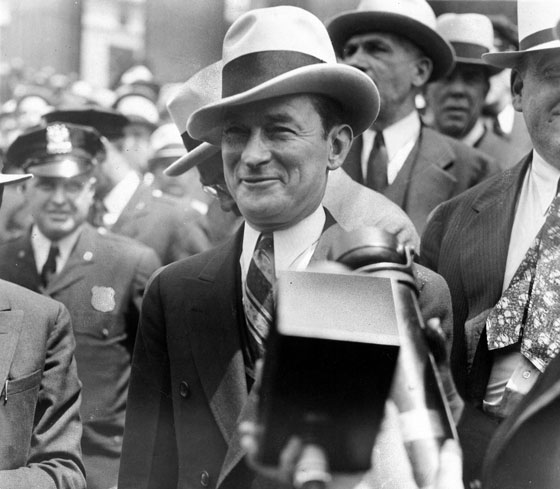
1932
Looking back, it was inevitable—the fall of Gentleman Jimmy. “No man could hold life so carelessly without falling down a manhole before he is done,” as a columnist at the time put it.
Jimmy Walker was the anti-Bloomberg, the mayor as unself-conscious hedonist in a top hat and swallowtail coat. He presided over New York during the great age of Gatsby and perfectly embodied that moment of indulgence: the public servant who favored short workdays and long afternoons at Yankee Stadium, who was loath to miss a big prizefight or Broadway premiere, who left his wife and Greenwich Village apartment for a chorus girl and a suite at the Ritz-Carlton.
As Walker framed it, he wanted to see his smile reflected in the faces of his constituents. And for a while, he did. New Yorkers loved their Jimmy, the crowds gathering at the Hudson River pier to wish him well when he set off on his European junkets.
But then the market cratered, and panic set in. New York’s archbishop spied divine retribution for the dubious character of the city’s leadership, though moral denunciations were the least of Walker’s concerns. With the city now deep in debt, Governor Roosevelt appointed a crusading judge, Samuel Seabury, to investigate City Hall.
The resulting scandal was spectacular, even for a city with a bar for municipal corruption set by Boss Tweed. The Police Department was running a protection racket so widespread that a sheriff who earned $8,500 a year had managed to squirrel away $400,000 in a box. One would be hard-pressed to find anything in Walker’s New York—contracts, leases, judgeships—that wasn’t for sale. All told, the mayor himself had accepted some $1 million in bribes.
A songwriter before getting into politics—anything to avoid the bar exam upon finishing law school—Walker’s biggest hit had been “Will You Love Me in December (As You Do in May)?” Metaphorically speaking, it was now December. The love for Walker faded; his resolve flagged. Roosevelt, needing to bolster his presidential candidacy, urged him to resign. “That dazzling, theatrical, and essentially absurd career has collapsed at last,” wrote the New York Herald-Tribune.
Eight days later, in September 1932, Walker again boarded a transatlantic liner for Europe, vowing to return soon to clear his name and again run for office. In truth, he was fleeing possible prosecution. It surely wasn’t how he had imagined it ending, but he’d had his fun.